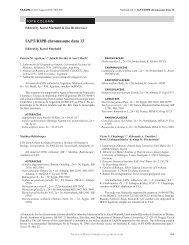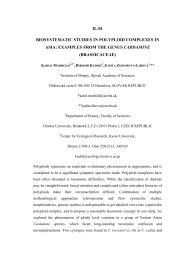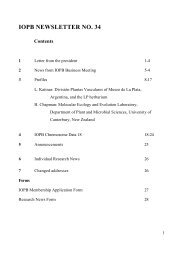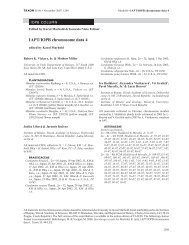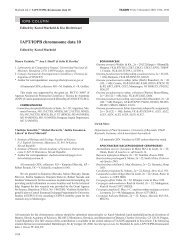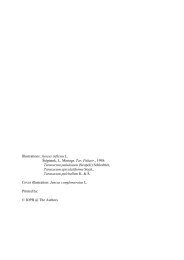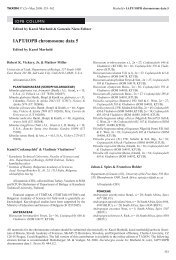CONTENS - International Organization of Plant Biosystematists
CONTENS - International Organization of Plant Biosystematists
CONTENS - International Organization of Plant Biosystematists
You also want an ePaper? Increase the reach of your titles
YUMPU automatically turns print PDFs into web optimized ePapers that Google loves.
O 31<br />
Evolutionary responses towards adaptation and speciation after<br />
allopolyploidization in Dactylorhiza (Orchidaceae)<br />
Ovidiu Paun, Mark W. Chase, Javier A. Luna, Robyn Cowan & Michael F. Fay<br />
Jodrell Laboratory, Royal Botanic Gardens Kew, Richmond TW9 3DS, U.K.;<br />
o.paun@kew.org, m.chase@kew.org, javoluna@gmail.com, r.cowan@kew.org,<br />
m.fay@kew.org,<br />
Hybridization and polyploidization are widespread in angiosperms and regularly<br />
stimulate plant evolution, promoting genetic diversity, evolutionary innovation,<br />
adaptive radiation and speciation. An important feature <strong>of</strong> allopolyploidization is its<br />
potential to occur repeatedly between the same parental taxa, leading to arrays <strong>of</strong><br />
allopolyploids that subsequently interbreed. In Dactylorhiza, ecologically divergent<br />
allotetraploids D. majalis, D. traunsteineri and D. ebudensis resulted from<br />
hybridization <strong>of</strong> diploids D. fuchsii and D. incarnata. In this system we are analysing<br />
consequences <strong>of</strong> polyploidy and hybridization on natural evolution <strong>of</strong> the genomes<br />
and adaptation to the environment. A genome-wide survey <strong>of</strong> the transcriptome at<br />
286 loci using cDNA amplified fragment length polymorphism (cDNA-AFLP),<br />
complemented by investigating epigenetic variation with methylation sensitive AFLP<br />
(MSAP), indicates extensive physical (non-epigenetic) differences in gene expression<br />
between parents and descendants, as well as between allotetraploids. Although no<br />
widespread repeatable loss <strong>of</strong> low copy DNA sequence is apparent in the hybrids,<br />
there is a significant increase <strong>of</strong> the number <strong>of</strong> transcripts expressed at a moment in<br />
time in the polyploids potentially resulting in biological complexity increase. Several<br />
novel transcripts in the polyploids are associated with environmental parameters and<br />
might represent parts <strong>of</strong> the molecular mechanisms that result in adaptation to<br />
different ecological conditions/habitats enforcing reproductive isolation. In addition to<br />
stabilizing allopolyploid genomes such novel expression patterns along with<br />
increased heterozygosity and gene redundancy might confer on hybrids an elevated<br />
evolutionary potential, with effects at scales ranging from the molecular to the<br />
ecological.<br />
32



